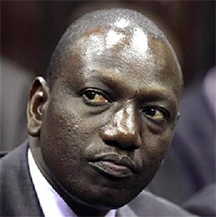AMSTERDAM/NEW YORK, (Reuters) – The International Criminal Court’s member states yesterday agreed to changes to the court’s trial procedures that could help defuse tensions between the court and the African continent regarding the approaching trial of Kenya’s president.

The changes approved by the court’s 122 members will make it easier for suspects to participate in trial proceedings via video link and create a special exemption for top government officials, Western diplomats said.
Kenya and its African Union allies have been lobbying hard for the trial of Kenyan President Uhuru Kenyatta to be halted or postponed, saying the case threatens to destabilise the East African region.
Kenyatta and his deputy, former political rival William Ruto, face charges of crimes against humanity relating to ethnic clashes after Kenya’s 2007 elections, when 1,200 people died.
The new rules allow judges to grant an exemption to a suspect who is “mandated to fulfill extraordinary public duties at the highest national level,” according to the text seen by Reuters.
Earlier this month, Kenya and the African Union failed in their bid to have the trials of Kenyatta and Ruto deferred by the U.N. Security Council for one year, leading some African leaders to urge Kenyatta to boycott his trial, which is due to start on Feb. 5.





